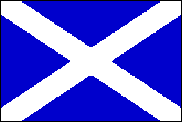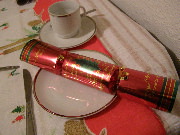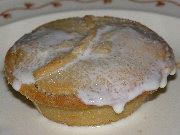
Halloween is the second holiday that the Irish brought to Great Britain, but this one through a deviation via America. Hence the children walk from house to house to beg for sweets, and older children have parties with horror-costumes. Unfortunately there is also a lot of rioting, rows and vandalism happening that night, an awkward side effect.
In the year 1605 on November 5th a group of catholic rebels tried to blow up the parliament in London with gunpowder. The aim was to kill King James I. and to install a catholic rule in England. The plan went wrong, the "Gunpowder Plot" was betrayed, and poor Guy Fawkes, who probably was only a handyman in this, was found sitting in the basement of the parliament building together with 36 barrels of gunpowder, which in case of ignition would have most likely turned the centre of London into one big crater.
Since then the rescue of the King is celebrated on this day. Bonfires and fireworks are lit, like in Germany on New Year's Eve. Marshmellows are toasted and potatos are roasted in the fire, and in some places a doll is burned which is supposed to personate the hapless Guy Fawkes. Today this is done rather humorously than politically, and it is just another reason to celebrate.
Everybody in Britain knows the rhyme that goes with the day:
Remember, Remember, the fifth of November
The Gunpowder treason and plot
I know no reason
Why gunpowder and treason
Should ever be forgot

On November 11th, the anniversary of the armistice in 1918, the fallen soldiers of the first world war are commemorated. At this time of the year many Brits wear a plastic poppy on the lapel, this is why this day is also called Poppy Day. The poppies are sold by veteran organisations for charity. It stems from the fact that after the bloody fights in Flanders and Picardy the poppy was the only flower that grew on the burying grounds of the fallen soldiers. There are official rememberance celebrations, where wreaths are layed down at memorials, mostly happening at the closest weekend from the 11th.
King Charles' III birthday is on the 14th of November. Normally, this is only noted on round birthdays, otherwise the official birthday is celebrated in June with the "troopng of the colour".

St. Andrew is the patron saint of Scotland, therefore St. Andrew's Day on November 30th is the national holiday there. Other than in England and Wales this day is an official holiday since 2006. But it is not a real bank holiday, since employers are not obliged to give the day off.
St. Andrew was an apostle as well as his brother St. Peter, and both were fishermenn. After the death of Jesus St. Andrew was to be crucified as well. Upon his own request he was tied to an X-shaped cross since he did not see himself worthy to die on the same cross as Jesus. Therefore this X-shaped cross (also named saltire cross) is called St. Andrew's cross.
Parts of his remains came to Scotland in the 7th or 8th century, alledgedly by supernatural forces, to a place where the city of St. Andrews stands today. But there are mundane explanations as well, like the fact that with the worship of St. Andrew the favour of the pope was aimed at, to have an ally against England.
However the bones came to Scotland, the white St. Andrew's Cross on sky blue background is forming the national flag of Scotland.
There are official celebrations on this day, but in general there are less activities than on Burn's night in January.
Christmas is by far the most important holiday on the Island. The effort put in for it is topped by no other holiday in the year.
It starts already in November with the present-buying and - much more important - the sending of Christmas cards. All relatives and friends get a card, this is planned meticulously that nobody is forgotten. The worst thing that can happen is to get a card from somebody who is not on the own list. Immediate reaction is necessary!

Cards are not only sent by post, at work e.g. they are simply swapped. The process eventually leads to a massive amount of cards with well-wishes and greetings in the house. These are shown off gladly, like in the window, or hung on strings across the living room, where they can be admired by visitors. If you start commenting about that from a German point of view, you'll hear things like "yeah, I know it is ridiculous, but what can you do?". Although the air of indifference is shown off: people would never want to do without it.
Of course there are also the mandatory christmas do's from work. These are held normally in a pub or a restaurant, who are quite prepared for that. What means that portions and quality are going down and prices are going up. These christmas do's are easy to spot since everybody wears the traditional paper crowns which are found inside the "Christmas Crackers", a must on this occasion. These are small table fireworks in form of an oversized candy which go off when the ends are torn apart. Inside are, depending on the price range, more or less cheap toys as well as the already mentioned paper crown. Traditionally the cracker is opened together with the one sitting next to you, each one pulling at one end, and the one who has the big part with the contents left is the one who has the luck on his side.

In the christmas season it is traditional to eat the so-called mince pies, for dessert, on their own or simply to to accompany the tea. These are small shortcrust pies filled with mincemeat. This is mostly translated wrong as minced meat, when in reality it is a pure vegetarian dish. The closest thing to describe it is a jam made with dried fruits and spices. In earlier times the mincemeat as well as the mince pies have been mostly home-made, today they are normally bought ready-made. By the way, in the North these are called "Happy Month".
When the holidays are approaching and the obstacles of card sending and present buying have been successfully negotiated, the next challenge is calling: food-shopping. On Christmas Eve the supermarkets open earlier than normal, usually at 6 am. When in normal times this is a rather dull hour, there are masses of people already waiting for the door to open on this day. It is quite unbelievable what's going before Christmas: couples entering with one trolley each, which both are filled to the overload, and everywhere are queues. People buy in huge amounts, and the poor employees do their best to keep the shelves stocked inbetween the buzzing crowds. Masses of money are spent, and there is hardly a customer with a bill below 1oo Pounds.
The big shopping is part of the plan to have a perfect Christmas. There can't be a shortage of anything, may it be vegetables or wine. Like I said before, this is the most important holiday of the year, and a failure because of money is just not on. There are quite a number of Brits who pay their Christmas shopping with a loan which has to be paid back painstakingly.
A funny little detail in the Christmas shopping are the Brussel sprouts. This vegetable lives a unimpressive existence during the rest of the year. But on Christmas every supermarket and every greengrocer has basketloads of it, and they sell like hotcakes. The reason is that Brussels are a traditional part of Christmas dinner, and without it it is just not perfect. And this despite the fact that not many people in Britain really like them. The best part of them finally goes to the dump, since after Christmas they are hated even more. What a pity.
Christmas time is the season of Pantomimes. In the English speaking countries this means something else than in Germany; if you are expecting dark clothes and white painted faces, as it would be for a mime artist, you will experience a colourful surprise, as this is a musical theatre with a strong and loud participation of the audience.
The pantos are most commonly based on fairytales, the classic ones being Cinderella and Aladdin. But the characters are more or less the same ones, independant of the story: there is the young male hero, played by an attractive young woman, his love interest, also a young woman, the Panto Dame, some kind of matron which is played by a man, and the comic lead, who talks in children's language with the audience. And last not least the bad guy, dressed in dark and alway greeted with Boohs from the audience.
During the play there is a constant involvement of the audience, up to a singing contest between two halves of the spectators. The classic dialogue arises, when some baddy runs in the back of the stage and the protagonists ask the audience where he is; and they start screaming "He's behind you!", what in return is answered by "oh no he isn't!", to which is shouted back "oh yes it is!". So if you like to reconsider your stereotype view of the stiff and tight-lipped Brit, the Panto is the place to go. But it might be wise not to seat yourself in the front row, as it can happen that you are picked as somebody who does not want to shout or sing, and you have to stand up and do that on your own in front of everybody, to the amusement of the actors and the audience.
Pantos range from the amateur-show in the village up to the London Westend with highly profiled actors. In any case, it is great fun for the young and the old.
On Christmas Eve, when everything is in, you can enjoy the calm before the storm, maybe go to church service, a lot of places do midnight masses. The presents are, in contrast to Germany, handed out only on Christmas Day.
When the big day arrives it gets really quiet in the country. There is hardly less traffic anytime else than on the morning of Christmas day. But it is only quiet outside, since inside the presents are handed out. The family sits together and the presents are unwrapped, while the roast is cooking in the oven. This is followed by the big family dinner, the whole day is spent with vast amounts of food (including Brussel sprouts) and drinks - here the classic one is cream sherry - until you just can't do anymore. One more highlight is the speech of the Queen in the afternoon. Alone for this the Brits would never want to abolish monarchy.
The second Christmas holiday, called boxing day, is then the complete opposite. Having done the big family get-together, the attention is now turned to the "Boxing Day Sales", meaning going shopping for the bargains which are found everywhere in the bigger shops at this day. The focus is here on the big chains and shopping centres. You might think that people are having enough of shopping after the pre-christmas stress, but you could not be more wrong. In the city centres it is packed with people, and this day has the highest turnover in some shops, especially furniture and electrical stuff are popular.
After Christmas leftover christmas accessories are sold off for half price, which is embraced by a number of people, since next Christmas is definitely coming, and you can never start early enough with planning....